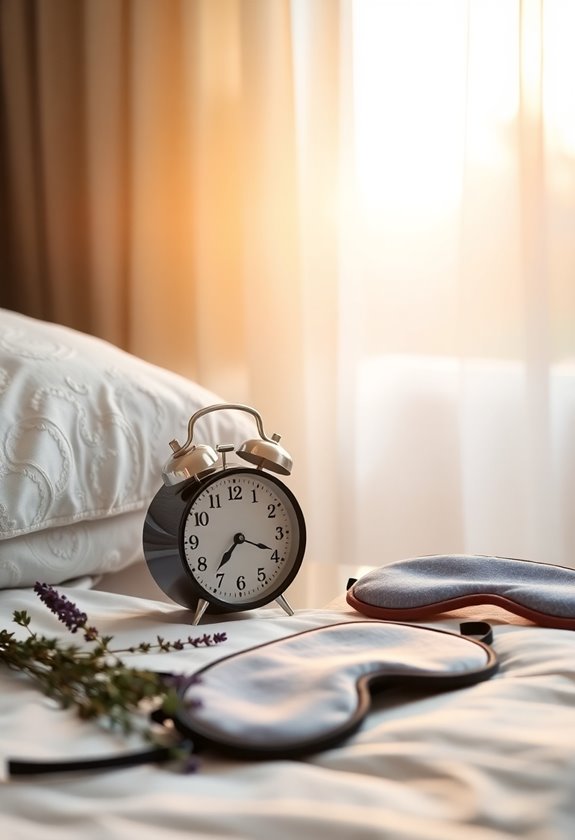You'll find natural sleep enhancement through seven powerful foods: tart cherry juice, rich in sleep-regulating melatonin; walnuts and almonds, packed with calming magnesium and zinc; Greek yogurt, containing tryptophan for serotonin production; kiwi fruit, high in sleep-promoting serotonin; oatmeal, which triggers insulin to help tryptophan reach your brain; bananas, loaded with muscle-relaxing magnesium and potassium; and fatty fish, providing sleep-supporting omega-3s and vitamin D. Consuming these foods 1-2 hours before bedtime can greatly improve your sleep quality, with each offering unique compounds that work together to support deeper, more restorative rest. These science-backed options offer just the beginning of your journey toward better sleep.
Highlights
- Tart cherry juice contains natural melatonin that regulates sleep cycles when consumed 1-2 hours before bedtime.
- Walnuts and almonds provide melatonin, magnesium, and zinc to support relaxation and better sleep quality.
- Greek yogurt's combination of tryptophan and calcium helps produce sleep-inducing hormones serotonin and melatonin.
- Two kiwi fruits eaten before bed increase sleep duration and quality through their high serotonin content.
- Oatmeal paired with bananas creates an ideal sleep-promoting meal rich in tryptophan, magnesium, and potassium.
Tart Cherry Juice

Sipping on tart cherry juice before bedtime can greatly improve your sleep quality. This natural sleep aid is rich in melatonin, the hormone that regulates your body's internal clock and sleep-wake cycles.
You'll want to drink one cup of pure tart cherry juice about 1-2 hours before you plan to sleep, as studies have shown it can help you fall asleep faster and stay asleep longer. The juice's anti-inflammatory properties also help reduce muscle soreness and joint pain that might keep you tossing and turning at night.
For the best results, you should choose unsweetened tart cherry juice that doesn't contain added sugars or preservatives. If you're worried about the tartness, you can dilute it with water or mix it into your evening tea.
Walnuts and Almonds

Reaching for a handful of walnuts and almonds before bed can give your sleep quality a natural boost. These nutrient-rich nuts contain high levels of melatonin, the hormone responsible for regulating your sleep-wake cycle, while also providing essential minerals like magnesium and zinc that help calm your nervous system.
You'll find that walnuts are particularly effective because they're one of the few foods that naturally contain alpha-linolenic acid, an omega-3 fatty acid that converts to DHA to support sleep regulation. When you combine them with almonds, which are packed with sleep-promoting minerals and protein, you're creating a powerful duo for better rest. For the best results, you should eat a small portion (about 1 ounce) roughly two hours before bedtime to allow proper digestion.
Greek Yogurt

Tranquility awaits in a bowl of Greek yogurt before bedtime, thanks to its impressive combination of tryptophan and calcium. These two power players work together to help your body produce both serotonin and melatonin, the essential hormones that regulate your sleep-wake cycle.
You'll get the most sleep-promoting benefits when you choose plain, unsweetened Greek yogurt about two hours before bedtime. The protein content helps stabilize your blood sugar throughout the night, while the probiotics support your gut-brain axis, which can influence sleep quality. If you're looking to enhance its sleep-promoting properties, you can pair your Greek yogurt with other natural sleep aids like honey or cherries, creating a perfect pre-bedtime snack that won't disrupt your digestive system.
Kiwi Fruit

This small, fuzzy fruit packs a powerful sleep-promoting punch, with research showing that eating two kiwis before bed can help you fall asleep faster and stay asleep longer. The secret lies in kiwi's high concentration of serotonin, an essential neurotransmitter that helps regulate your sleep-wake cycles and promotes relaxation throughout your body.
You'll also benefit from kiwi's impressive array of sleep-supporting nutrients, including:
- Antioxidants that reduce inflammation and promote better sleep quality
- High levels of vitamin C, which can help lower cortisol levels
- Folate and potassium that support healthy sleep patterns
- Natural fiber that helps maintain stable blood sugar levels overnight
For the best results, you should eat two medium-sized kiwis about an hour before bedtime, giving your body time to process their sleep-enhancing compounds.
Oatmeal

While kiwis work their magic through serotonin, a warm bowl of oatmeal offers its own unique pathway to better sleep. You'll find that oatmeal contains complex carbohydrates that trigger insulin production, which helps transport tryptophan to your brain more efficiently. When you eat oatmeal before bed, you're also getting essential nutrients that support sleep quality:
- Magnesium, which naturally relaxes your muscles and helps regulate sleep-wake cycles
- B vitamins that assist in melatonin production, your body's primary sleep hormone
- Fiber that keeps you feeling satisfied throughout the night, preventing hunger disruptions
For the best results, you'll want to enjoy your oatmeal about two hours before bedtime, topped with sleep-promoting ingredients like banana slices, almonds, or a drizzle of honey.
Bananas

Bananas stand among nature's most effective sleep-promoting fruits, packing a powerful combination of magnesium and potassium that helps relax your muscles and calm your nervous system. You'll find they're particularly effective when eaten about an hour before bedtime, as they contain natural muscle relaxants that can ease you into sleep.
What makes bananas especially beneficial for sleep is their high content of tryptophan, an amino acid that your body converts into serotonin and melatonin, two essential sleep-regulating hormones. When you're choosing bananas for sleep benefits, opt for ones that are fully ripe, as they'll contain more readily available nutrients and natural sugars that can help transport tryptophan to your brain more efficiently.
Fatty Fish

Including fatty fish in your evening meal can greatly boost your sleep quality, thanks to its abundance of omega-3 fatty acids and vitamin D. When you consume fish like salmon, mackerel, or tuna, you're providing your body with essential nutrients that help regulate serotonin, a vital hormone for sleep-wake cycles.
Studies show you'll get the best results by eating fatty fish at least twice a week, particularly during your evening meal. The combination of vitamin D and omega-3s works to enhance your body's production of melatonin, the hormone that signals it's time to sleep. You'll find that fatty fish also contains tryptophan, an amino acid that naturally helps calm your mind and prepare your body for restorative sleep.
Frequently Asked Questions
How Long Before Bedtime Should I Eat Sleep-Promoting Foods?
Studies show that 90% of people who eat within one hour of bedtime experience disrupted sleep patterns. You'll want to consume sleep-promoting foods 2-3 hours before your intended bedtime, allowing your body to properly digest while maintaining stable blood sugar levels. If you're particularly sensitive to evening eating, you can extend this window to 4 hours, which helps your digestive system fully process the food before sleep.
Can I Mix These Foods Together for Better Sleep Results?
Combining sleep-promoting foods can enhance their sedative effects, as certain nutrients work synergistically together. You'll get ideal results by pairing foods like cherries with complex carbs, or combining magnesium-rich nuts with calcium-containing dairy products. However, you shouldn't mix too many different foods before bedtime, as large portions or complex meals can disrupt your sleep by forcing your digestive system to work overtime.
Are There Any Sleep-Promoting Foods to Avoid During Pregnancy?
While pregnant, you'll want to avoid excessive caffeine-containing foods like chocolate, especially near bedtime, and limit herbal teas containing chamomile, valerian root, or passionflower. You should also skip high-mercury fish like tuna, which some consider sleep-promoting. Though turkey is generally safe, don't overdo it as large portions of protein can disrupt sleep during pregnancy due to slower digestion.
Do These Sleep-Promoting Foods Work the Same for Children?
When your eight-year-old can't sleep, you might be tempted to offer the same sleep-promoting foods that work for adults, but children's bodies process nutrients differently. While foods like bananas and milk can support healthy sleep in kids, you'll need to adjust portions and timing. Don't give them sleep-promoting foods within two hours of bedtime, as their smaller digestive systems may actually keep them awake.
Will Eating These Foods During Daytime Affect My Alertness Levels?
While sleep-promoting foods won't make you instantly drowsy during daytime hours, they can support your body's natural circadian rhythm when consumed strategically. You'll generally maintain normal alertness if you eat these foods throughout the day, as their sleep-inducing properties work best when combined with your body's natural nighttime melatonin production. Small amounts won't greatly impact your daytime performance, but you might want to avoid large portions close to important tasks or meetings.




